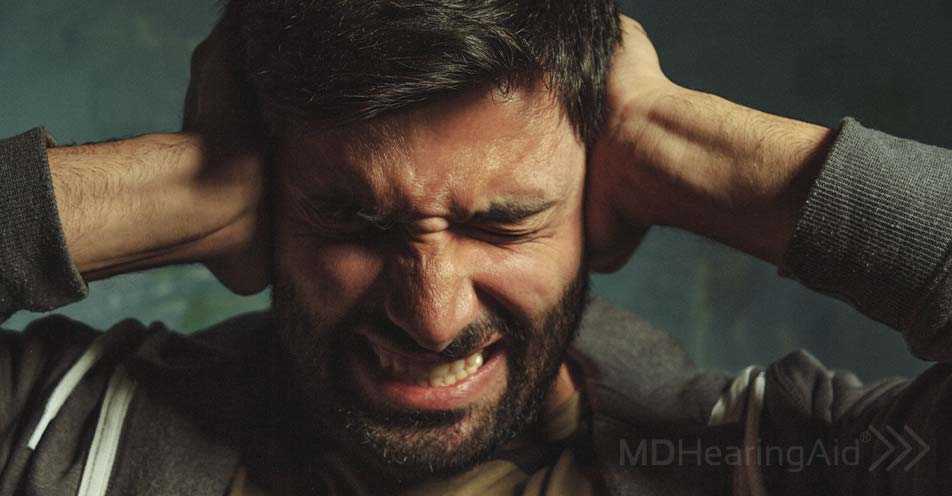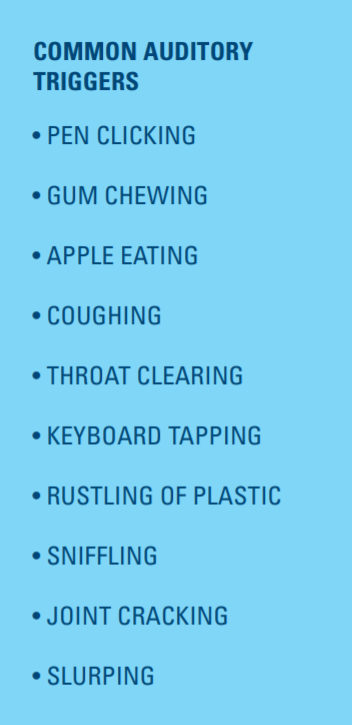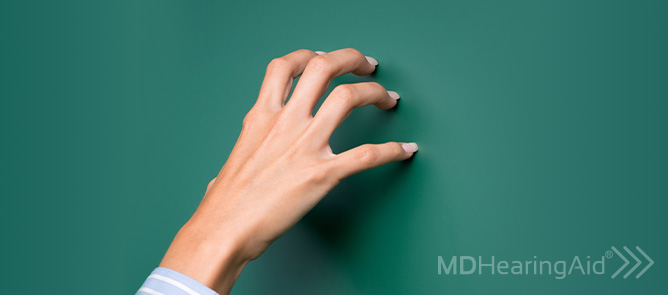Have you ever heard sounds that make you irritated, anxious, or downright angry? If so, you may have what’s called misophonia. Many people cringe when hearing certain sounds, not realizing that it can be due to a hearing issue. But don’t worry, you’re not alone; it’s more common than you might think.
As a student, it may have been funny when the typical class clown scratched on the chalkboard while the teacher was out of the room. You may have noticed that some kids weren’t bothered by it while others screamed in agony. Why is that, you wonder? Well, some people who have misophonia are so affected by a certain sound that it can throw them into a rage. As harmless as it seems, this hearing concern can be debilitating for some people.
We realize this topic may be new for most, so we set out to answer many of the common questions surrounding this type of hearing issue. First, we’ll define what misophonia is and what causes it. Next, we’ll explain the role that the brain plays in misophonia. Lastly, we’ll discuss the methods for diagnosing and treating this type of hearing issue. We’ll also share valuable tips and affordable options. Here’s a handy snapshot of what we’ll talk about and links for you to jump to:
- What is Misophonia?
- What Happens When You Have Misophonia?
- What Causes Misophonia?
- How is Misophonia Diagnosed and Treated?
- Can My Symptoms Be Nothing But Grima?
What is Misophonia?
Misophonia is a condition where someone hears a sound that leads them to feel anything from mild annoyance to severe rage. The name, coined in a 2001 article published by audiologists Dr. Margaret Jastreboff and Dr. Pawel Jastreboff, is pretty easy to pick apart and understand. Etymologically speaking, misophonia comes from two Greek words: misos (“dislike” or “hate”) and phónè (“voice” or “sound”). Literally, it means “hatred of sound.”
Specifically, we can define misophonia as a condition in which particular sounds cause a person to have a negative emotional reaction. These sounds are often called “triggers.” This may make more sense if you think about someone who has hay fever. In the spring, being outdoors causes them to sneeze or get itchy, watery eyes. In this case, pollen is the trigger of hay fever. Likewise, if you have misophonia, you may respond when hearing your particular trigger sound (e.g., that terrible blackboard-scratching).
Image Source: milkeninstitute.org
There’s a range of sounds that can trigger a reaction. Certain sounds are more likely to cause a reaction in people with misophonia. Researchers conducted a study on patients with misophonia to examine the type of sounds that commonly caused a reaction. As a result, they found that most misophonia sound triggers fell into three categories:
- Drinking or eating sounds (81.0%)
- Loud breathing or nose sounds (64.3%)
- Finger or hand sounds (59.5%)
On the surface, it seems easy to understand misophonia. It’s something that almost anyone can relate to at some level, even if you don’t have it. At the same time, it’s not as cut-and-dry for people to describe misophonia as an annoyance to specific sounds. Unfortunately, scientists have done few studies on misophonia. To this day, researchers and doctors continue to grapple with how to define misophonia and figure out which discipline it fits.
Misophonia and Related Terms
Before the term misophonia came about, medical professionals weren’t sure what to call it. They used several names: sound-rage, select sound sensitivity syndrome, soft sound sensitivity symptom, and decreased sound tolerance. In 1997, Audiologist Marsha Johnson saw her first case and later named it Selective Sound Sensitivity Syndrome (4S). Eventually, misophonia became the more popular term but not without some lingering confusion. There are a few other terms or conditions that are similar to misophonia.
Hyperacusis
Hyperacusis (also spelled hyperaccussis) is often confused with misophonia. In Greek, hypo- means “over, more than” and akousis means “hearing” – excessive or exaggerated hearing. If you have hyperacusis, then a particular sound range seems more excessive or pronounced than normal. For example, some people with hyperacusis can’t tolerate concerts because the music hurts their ears. This condition is common in children. You can have both misophonia and hyperacusis. The key difference between the two is that misophonia doesn’t involve sensitivity to the loudness or pitch.
Phonophobia
If a particular sound scares you, it’s called phonophobia. Some researchers consider phonophobia to be a subtype of misophonia. Other researchers make it a separate condition, saying that people with misophonia don’t have dominating fearful reactions. Like hyperacusis, phonophobia is common in children, particularly those with Autism Spectrum Disorder.
Misokinesia
Misokinesia is a newer term used to describe when someone has a negative response to a particular movement or behavior (e.g., tapping a foot). If you have misophonia, you may react to movements associated with a specific sound even if you can’t hear that sound. Scientists aren’t sure if misokinesia is a subtype of misophonia or its own condition.
What Happens When You Have Misophonia?
A person who has misophonia will experience a wide range of symptoms. These can involve reactions to your body that are emotional, psychological, and physiological. In a general sense, it would seem that this could be described as grima. In Spanish, grima means the unpleasant feeling you get when hearing certain sounds, like that chalkboard. However, the term is more nuanced as Spanish-speaking individuals don’t typically associate these feelings with disgust. The extreme sense of disgust and other reactions is more characteristic of misophonia.
Emotional or Psychological Reactions
- Anxiety
- Agitation
- Annoyance
- Anger
- Distress
- Disgust
- Irritability
- Rage
- Hatred
- Aggression
- Behavioral reactions
Physical Reactions
- Unpleasant sensations
- Body shivering
- Skin tingling
- Chest pressure
- Tight muscles
- Higher blood pressure
- Faster heart rate
- Raised body temperature
There is no type, frequency, or volume of sound specifically associated with misophonia. Different people have different reactions to different sounds. Typically, when you have misophonia, there will be a particular sound or set of sounds that just gets your goat, so to speak. You may have one or more of the various emotional and physical responses. You might even respond to these sounds by visual triggers when someone repeats an action like tapping a pen.
What Causes Misophonia?
Nobody knows what causes misophonia. Scientists have focused very little research on it. Some researchers say it starts during early childhood. Others say symptoms appear in 9- to 12-year-olds. In either case, misophonia shows up before puberty. The first trigger sound that a child hears usually comes from a family member like a parent. Over time, they can develop reactions to other triggers. Misophonia also tends to impact more women than men.
What researchers have found out, though, is that people with certain conditions are more likely to have misophonia. While misophonia is in a category by itself, a person’s emotional and physical reactions often mimic or overlap these conditions. In fact, doctors have misdiagnosed many with having anxiety, phobias, and other conditions.
- Anxiety disorders
- Obsessive-compulsive disorder (OCD)
- Obsessive-compulsive personality disorder (OCPD)
- Tourette syndrome
- Tinnitus (ringing in the ears)
- Other hearing issues
There are also several risk factors associated with misophonia. You could be more likely to have an adverse reaction if you fit in any one of the following risk factors:
- Prepubescent girls
- People with high IQs
- Family history of misophonia (genetic)
If you think you have misophonia or have noticed issues with your hearing, it makes sense to get your ears checked out. Often, physicians attempt to diagnose misophonia by ruling out similar disorders. It’s easy to find a place where an audiologist can test your hearing.
You can visit a local hearing clinic or take a free online hearing test!
How is Misophonia Diagnosed and Treated?
Just as with the lack of information on how to define misophonia and its causes, there are challenges when it comes to diagnosing and treating it. For example, there have been questions as to whether misophonia is a mental illness.
From a medical standpoint, practitioners find it difficult to diagnose misophonia in patients. In many ways, it appears as if it’s a mental disorder. This would imply that professionals could use diagnostic tools such as the Diagnostic and Statistical Manual of Mental Disorders (DSM-5) issued by the American Psychiatric Association (APA). DSM-5 serves as a guide to assess and diagnose mental disorders but doesn’t provide information for treatment. Technically, doctors can’t diagnose misophonia as a mental illness because the APA hasn’t listed it. Some doctors have proposed the addition of misophonia under the category of “Obsessive-Compulsive and Related Disorders.”
The bad news is that misophonia has no FDA-approved medications or treatments to cure you of it. It’s considered to be a disorder that you must live with throughout your life. The good news is that there are many options to help manage or cope with it. Some of the therapeutic approaches include:
- Tinnitus Retraining Therapy (TRT) – Training allows you to better tolerate sounds in a single course of treatment.
- Cognitive Behavioral Therapy (CBT) – Psychotherapy helps you respond in a more positive way to noise triggers in as little as 10-12 sessions.
- Supportive Counseling – Therapy designed to support you and affected family members.
There are also simple ways to deal with misophonia. Clinicians use some of these tips in therapy and counseling. Here are just a few things for you to consider:
- Move away from sounds that trigger your negative reactions whenever possible
- Practice mimicking trigger sounds to train yourself to tolerate them when you can’t leave
- Drown out annoying noise with music played in headphones
- Reduce or block offensive sounds by wearing earplugs
- Practice meditation and other techniques to relax and reduce stress
Even though there are no available diagnostic tools or effective medicines for people with misophonia, there’s no reason that it has to remain debilitating. In addition to the mentioned therapy options, you may find relief in trying some coping tips. Don’t assume that because certain sounds are irritating to you, you’re just having the typical feeling of grima.
Do You Have Misophonia?
Many people hear certain noises that bother them and struggle to live with it. This can cause them to react in various ways, from feeling a little disturbed to outright rage. It could be as simple as what the Spanish call “feeling grima,” or it could be a severe problem like misophonia or similar conditions.
Sounds That are Annoying to Most People
So, about that screeching chalkboard – here’s an interesting fact. You’d think that because the sound is piercing to your ears and can make your skin crawl, it’s a high-frequency sound. It turns out that the sound actually falls within the mid-range of hearing frequencies (2000-4000 Hz). Researchers have found that the human ear is the most sensitive at this range. They've offered several explanations:
- Ear Canal – Your ear has a structure that causes amplified sounds within that frequency.
- Fear – Your brain has a fear response that can affect sound processing in the ear.
- Instinct – Researchers also suggest that chimpanzees, man’s distant relative, let out a warning cry when they hear this sound range.
Sounds That Make Life Difficult for People With Misophonia
One in five people has strong feelings when they hear certain noises. Some are so negatively affected by the sounds that their quality of life is greatly reduced. Misophonia can make it difficult or impossible to function in daily activities like going to school or work, spending time with family, and enjoying social events.
Aside from people who have misophonia, grima is generally experienced by many. This is to say that many sounds can annoy you. When your hair stands on end at the sound of chalk-scratching or a child gets scared of a vacuum cleaner, that doesn’t mean they have misophonia.
Why Should You Have Your Ears Tested?
One of the common links between all the issues we’ve discussed is that they involve some aspect of hearing. If you’ve been having problems with your hearing, you’re not alone. Many people are negatively affected by sound and wonder why some sounds aggravate them and what they can do. If you have misophonia, hearing devices that go in or on your ears can help provide some relief from your symptoms.
Like any audiologist, we always recommend that you take a hearing test first. You can try our online hearing test now and get results right away. It’s totally free! If you have hearing loss, misophonia, or other disorders, there are plenty of top brand hearing aids to choose from. Some of our devices may even help you and other people to cope with misophonic sounds. At MDHearing, we offer high-quality, FDA-registered hearing aids at a much lower cost than most other hearing aid providers.
Want to test your hearing? Take our easy, 5-minute test and get your results instantly.
TAKE ONLINE HEARING TEST


